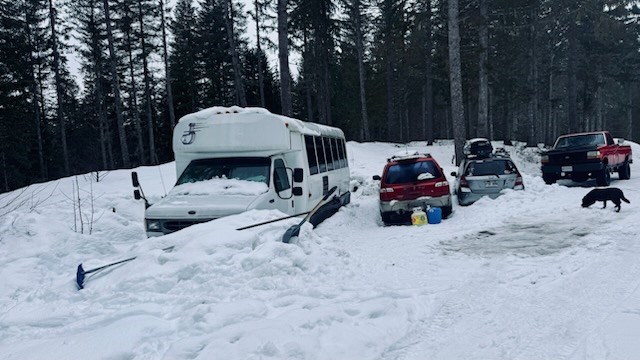Cheakamus Crossing resident Gabi Möeller usually avoids ski touring up Cheakamus Lake Forest Service road (FSR) because of the potential for her two dogs to consume garbage left by illegal campers. Her most recent attempt resulted in one of her labs getting sick from what she described as drug-laced human feces.
“Within 10 to 15 minutes, my younger dog started to wobble. We realized she needed to go home," she said. "She could run a bit but then stopped. I had to carry her out for the three kilometres. I have two labs that are troublemakers, but my dog got sick here last year in the same spot."
While her dog recovered, the incident reignited her concern to have authorities address the long-term illegal campers that present a safety concern.
Last summer, the same area attracted attention from the Resort Municipality of Whistler (RMOW), when a resident wrote a letter detailing their concerns to council. In response, the RMOW discussed the risk of fire from illegal camping in Cheakamus and WedgeWoods to the north of Whistler that is also outside of the RMOW’s boundary.
At a subsequent meeting, staff and council detailed their outreach, including a planned site visit from multi-jurisdictional stakeholders and proposed signage.
In an interview, Whistler Mayor Jack Crompton said patrols have been stepped up over the winter.
“Our fire crews have increased patrols around Cheakamus Lake FSR. They haven’t been called to any incidents because of fires from campers in the area," he said. "Since we last spoke to the Pique, we received provincial support helping minimize hazards with provincial wildlife officers and natural resource officers increasing patrols of the area, fire and bylaw continue to monitor at Cheakamus and Wedge. This will increase when the snow melts and the fire hazards increase. Fire remains our greatest concern."
Crompton also said new signage has been placed at the entrance to Cheakamus Lake FSR and pointed to tours politicians and provincial staff have had in Whistler that detailed the town's challenges.
“We hope that our continued advocacy brings additional support from the government of jurisdiction… I don’t want to give the false impression that we have enforcement power," Crompton said. "Our greatest tool is our advocacy.”
Möeller has contacted the RMOW, the Squamish-Lillooet Regional District, Conservation, BC Parks and Whistler’s MLA. While she understands the area is outside of the RMOW’s jurisdiction, she said her numerous reports to Conservation have gone nowhere.
“It has a reputation that nobody will bother them. Anywhere on municipal lands bylaw will kick them out, but in Cheakamus, Conservation isn’t acting,” she said.
Pique contacted the Conservation Officer Service and was redirected to the Natural Resource Officer Service under the Ministry of Forests (MOF). The MOF is responsible for enforcing the Land Act, under which people can camp on Crown Land in one location for up to 14 days.
“No formal enforcement actions have been taken at this time along the Cheakamus Lake FSR as Natural Resource Officers are working with other government agencies, RCMP, regional district and the municipality to achieve voluntary compliance,” said Ravi Parmar, Minister of Forests.
While Möeller empathizes with people who need housing, she doesn’t accept irresponsible behaviour that poses a risk to the environment, animals and other recreators.
“I think there needs to be regular enforcement on that road," she said. "I have no issue of people camping for a reasonable amount of time. Platforms, generators and propane with no sanitation isn’t OK. We need regular enforcement to stop the regular abuse."


